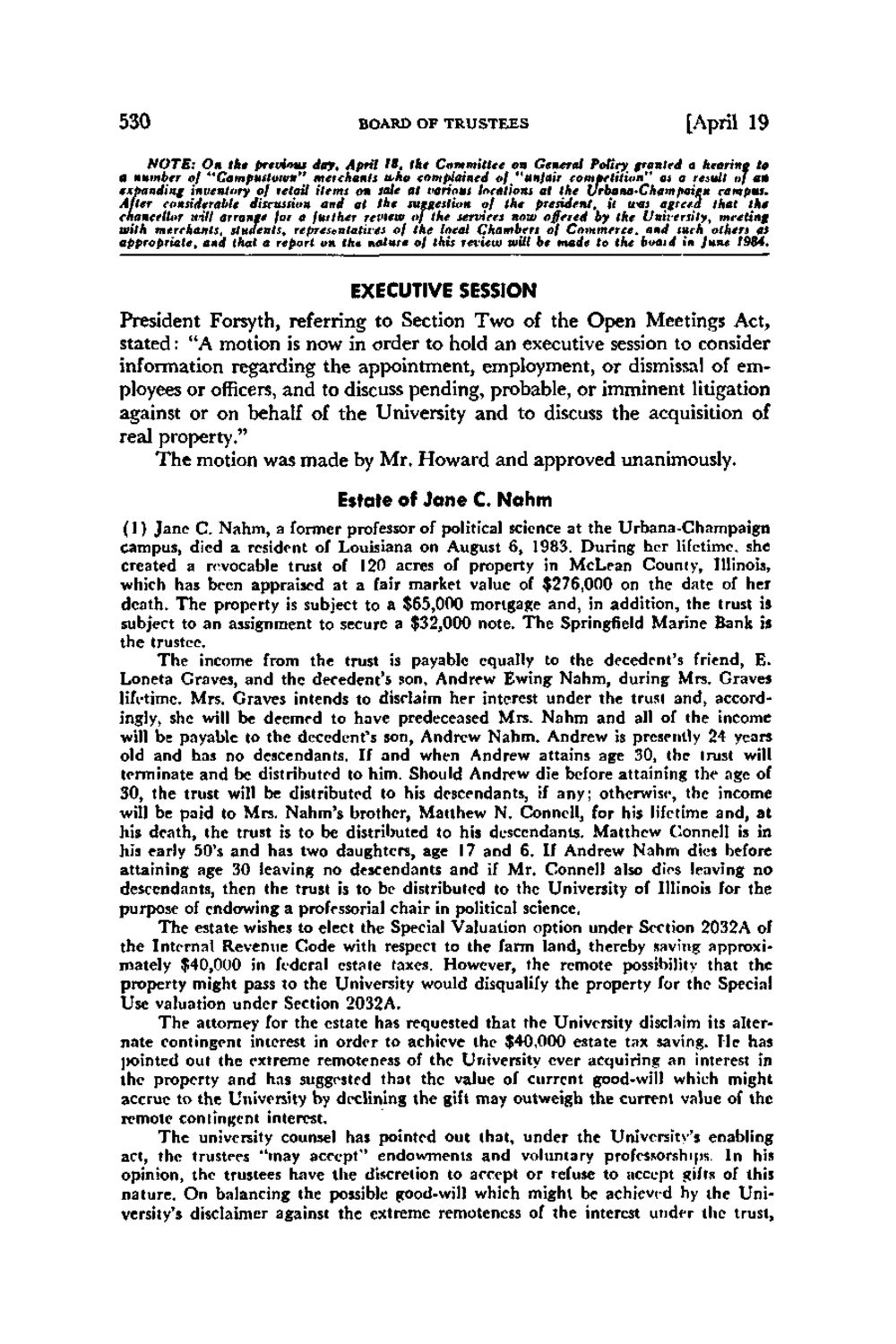| |
| |
Caption: Board of Trustees Minutes - 1984
This is a reduced-resolution page image for fast online browsing.

EXTRACTED TEXT FROM PAGE:
530 BOARD OF T R U S T E E S [April 19 NOTE: On ike previous day, April 18, the Committee on General Policy granted a hearing to a number of **Campustown** met chants who complained of "unfair competition" as a result of un expanding inventory of retail items on sale at various locations at the Urbana-Cham paten campus. After considerable discussion and at the suggestion of the president, it was agreed that the chancellor tviti arrange for a further reptew of the services now offered by the University, meeting with merchants, students, representatives of the local Chambers of Commerce, and such others as appropriatet and that a report on the nature of this review will be made to the boaid in June 1984. EXECUTIVE SESSION President Forsyth, referring to Section Two of the Open Meetings Act, stated: "A motion is now in order to hold an executive session to consider information regarding the appointment, employment, or dismissal of employees or officers, and to discuss pending, probable, or imminent litigation against or on behalf of the University and to discuss the acquisition of real property." The motion was made by Mr. Howard and approved unanimously. Estate of Jane C. Nahm ( I ) Jane C. Nahm, a former professor of political science at the Urbana-Champaign campus, died a resident of Louisiana on August 6, 1983. During her lifetime, she Created a revocable trust of 120 acres of property in McLean County, Illinois, which has been appraised at a fair market value of $276,000 on the date of her death. The property is subject to a $65,000 mortgage and, in addition, the trust is subject to an assignment to secure a $32,000 note. The Springfield Marine Bank is the trustee. The income from the trust is payable equally to the decedent's friend, E. Loneta Graves, and the decedent's son, Andrew Ewing Nahm, during Mrs. Graves lifetime. Mrs. Graves intends to disclaim her interest under the trust and, accordingly, she will be deemed to have predeceased Mrs. Nahm and all of the income will be payable to the decedent's son, Andrew Nahm. Andrew is presently 24 years old and has no descendants. If and when Andrew attains age 30, the trust will terminate and be distributed to him. Should Andrew die before attaining the age of 30, the trust will be distributed to his descendants, if any; otherwise, the income will be paid to Mrs. Nahm's brother, Matthew N. Connell, for his lifetime and, at his death, the trust is to be distributed to his descendants. Matthew Connell is in his early 50's and has two daughters, age 17 and 6. If Andrew Nahm dies before attaining age 30 leaving no descendants and if Mr. Connell also dies leaving no descendants, then the trust is to be distributed to the University of Illinois for the purpose of endowing a professorial chair in political science. The estate wishes to elect the Special Valuation option under Section 2032A of the Internal Revenue Code with respect to the farm land, thereby saving approximately $40,000 in federal estate taxes. However, the remote possibility that the property might pass to the University would disqualify the property for the Special Use valuation under Section 2032A. The attorney for the estate has requested that the University disclaim its alternate contingent interest in order to achieve the $40,000 estate tax saving. He has pointed out the extreme remoteness of the University ever acquiring an interest in the property and has suggested that the value of current good-will which might accrue to the University by declining the gift may outweigh the current value of the remote contingent interest. The university counsel has pointed out that, under the University's enabling act, the trustees "may accept" endowments and voluntary professorships. In his opinion, the trustees have the discretion to accept or refuse to accept gifts of this nature. On balancing the possible good-will which might be achieved hy the University's disclaimer against the extreme remoteness of the interest under the trust,
| |